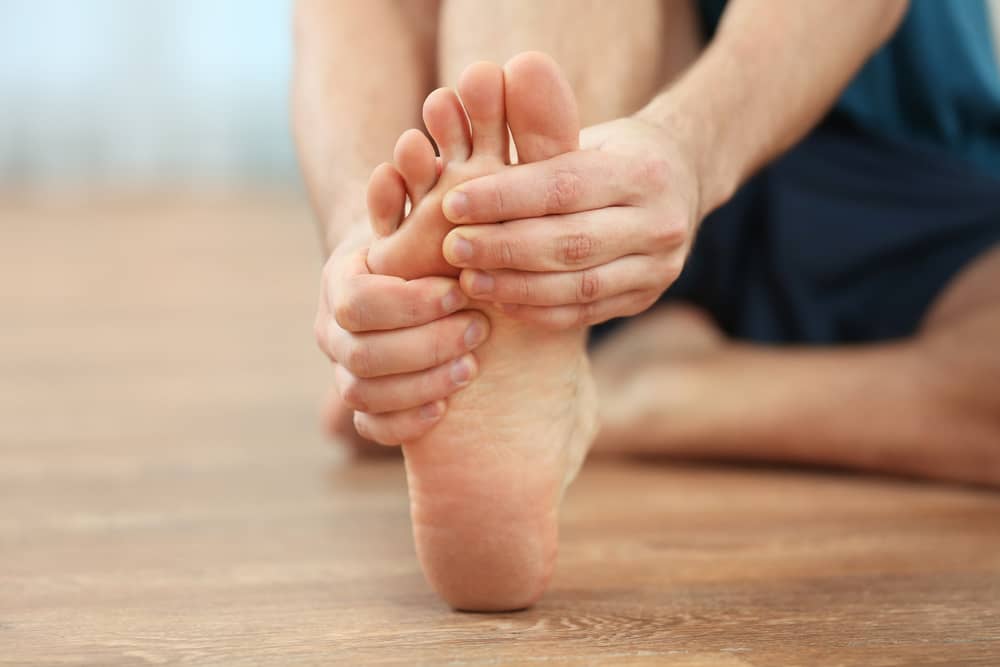
Often the unwanted product of repeated stress on the feet, plantar fasciitis is a painful condition that comes about when the tendon that runs along the arch of the foot becomes strained, making it feel tight and not as pliable as it should be.
The Plantar Fascia is a broad, dense, virtually non-elastic tissue that runs the length of the arch along the bottom of your foot. The plantar fascia helps to maintain the medial longitudinal arch and transmit forces from the hind to the forefoot.
It can act as both a beam and a truss: a beam during propulsion and a truss when the foot absorbs the impact force during landing and during the stance phase of gait. The plantar fascia is thickest at the heel where it attaches to the heel bone (calcaneus) and broadens out into five bands that continue into the fascial sheets of each toe.
Plantar fasciitis is an inflammation of the plantar fascia especially at its calcaneal insertion. Symptoms vary, but many with the condition report the heel pain described as sharp, burning, dull aching, or sometimes as a pulling sensation. The pain is usually worse with the first few steps out of bed, then lessens in intensity. The pain is usually low-grade and may actually decrease when you walk; however, by mid to late afternoon the strain to the plantar fascia is cumulative and can cause severe pain.
Patients also commonly experience tenderness along the inside of the heel pad or anywhere along the length of the plantar fascia, localized swelling is sometimes visible, and acute pain may occur as you stand after sitting for half an hour or more. When your feet hurt with every step you take, it can be very physically and emotionally stressful, making it difficult to remain active, manage stress, control weight, and have a healthy lifestyle.
A regimen that includes a lot of running and/or sprinting is often the culprit. Pair that with other factors like having naturally flat feet or using poor footwear that doesn’t provide enough support and you have a recipe for disaster. Other factors can include obesity, trauma or simply being on your feet a lot – hence the reason it was once called “policeman’s heel.”
It is also commonly associated with weight bearing, shoes with little or no arch support, and alteration of the plantar support. It is usually considered an overuse syndrome caused by excessive stretching, repetitive and abnormal stress, excessive pronation of the foot, flat or high-arched foot structures, and tight Achilles tendon. Less frequently a traumatic rupture could be the cause. The plantar fascia may be altered in different systemic pathologies. For example, in type I diabetes the plantar fascia is susceptible to glycation, oxidation, and thickening. The plantar fascia may also be involved in psoriasis, ankylosing spondylitis, and fibromatosis. It may also appear in degenerative alterations such as calcification and cartilaginous metaplasia.
Unfortunately, plantar fasciitis won’t go away overnight. Recovery is a gradual process that requires patience and proper home self-management to overcome and prevent a daily cycle of chronic re-injury. Stretching exercises and dorsiflexion night splints are often prescribed to relieve the plantar fascia tension. To also help with the management of symptoms, Dr. Bert also suggests rolling the arch of your foot over a golf ball, frozen water bottle, or rolling pin gently for five minutes at a time to stretch out the strained tendon. Wearing proper footwear for your activity and foot structure, changing sneakers every two months, wearing thicker socks, and stretching your Achilles should also help get you back to being comfortable on your feet.
Let Knoxville Spine & Sports help you get back on your feet. If you need treatment for plantar fasciitis in Knoxville, TN, call us at (865) 337-5574 today to schedule an appointment!
8029 Ray Mears Blvd, Suite 300
Knoxville, TN
37919
Phone: 865-337-5574
Monday
7am-12pm & 1pm-6pm
Tuesday
7am-12pm & 1pm-4pm
Wednesday
7am-1pm
Thursday
7am-12pm & 1pm-6pm
Friday
7am-12pm & 1pm-4pm
Saturday & Sunday
Closed